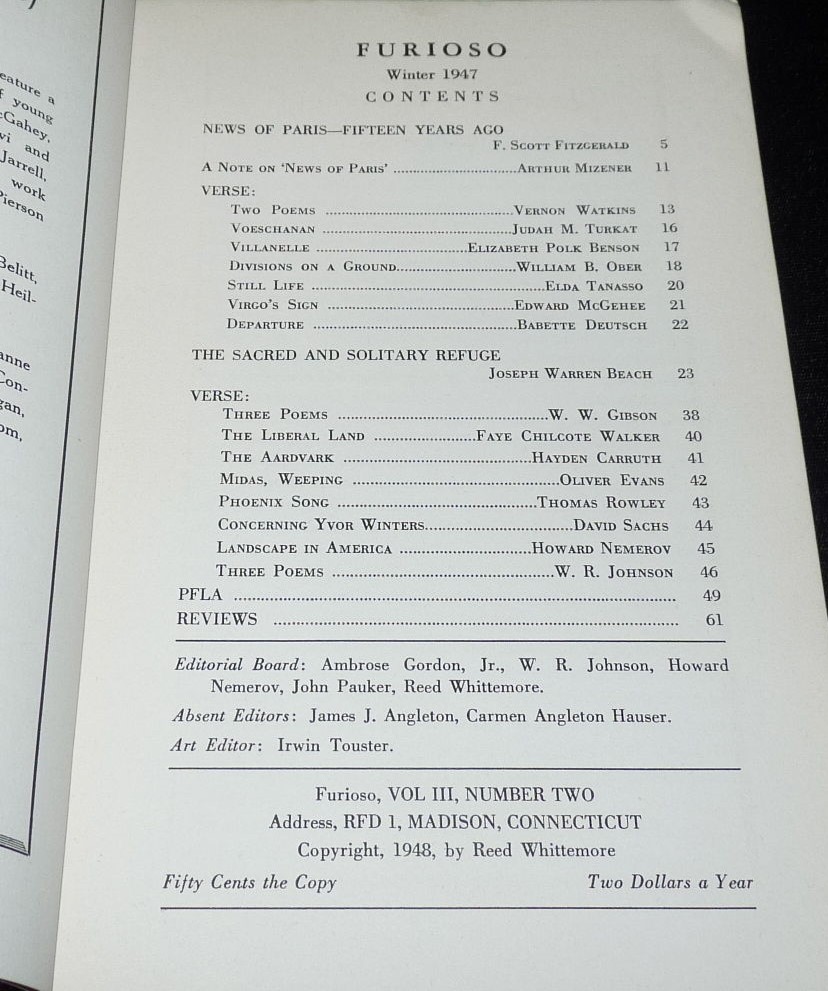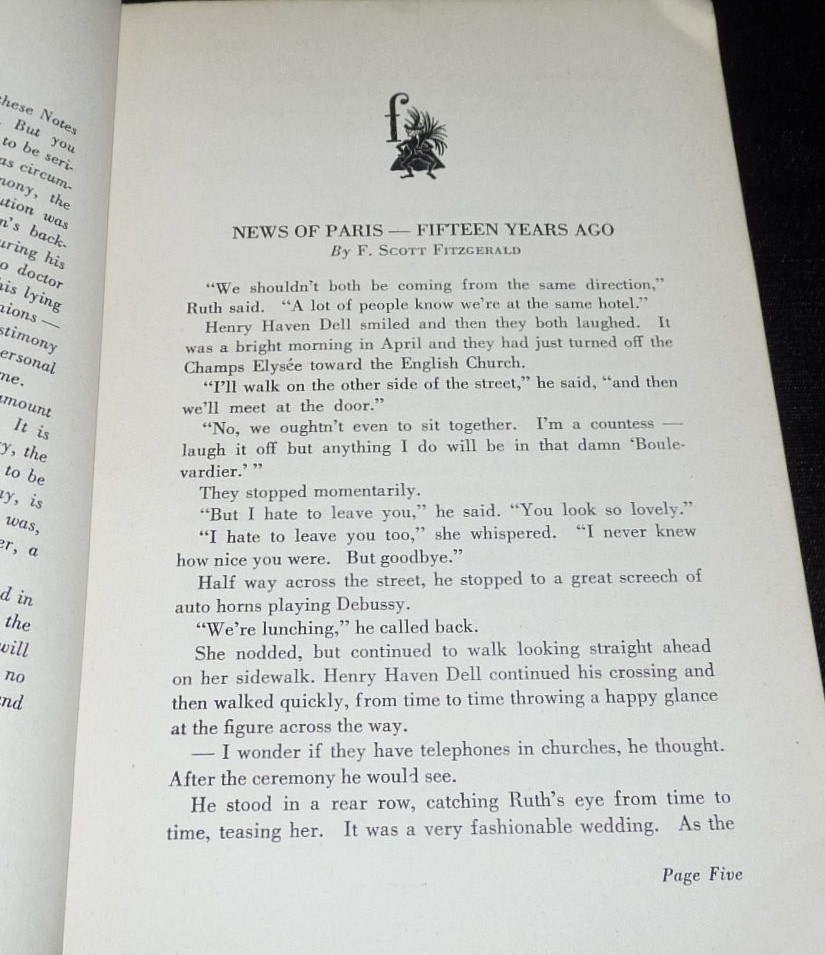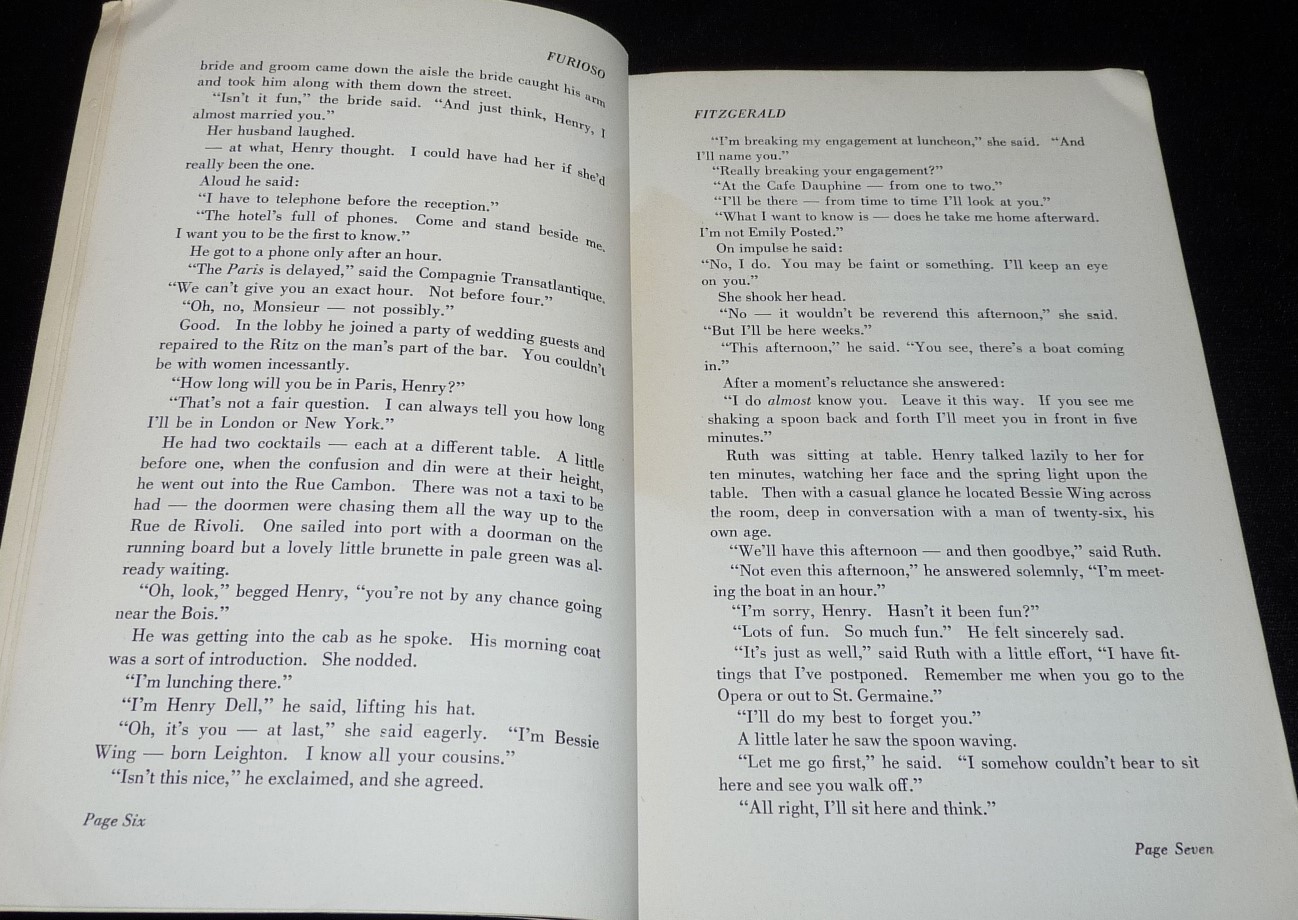
News of Paris—Fifteen Years Ago
by F. Scott Fitzgerald
“We shouldn't both be coming from the same direction,” Ruth said. “A lot of people know we're at the same hotel.” Henry Haven Dell smiled and then they both laughed. It was a bright morning in April and they had just turned off the Champs Elysees toward the English Church.
“I'll walk on the other side of the street,” he said, “and then we'll meet at the door.”
“No, we oughtn't even to sit together. I'm a countess—laugh it off but anything I do will be in that damn ‘Boulevardier.’”
They stopped momentarily.
“But I hate to leave you,” he said. “You look so lovely.”
“I hate to leave you too,” she whispered. “I never knew how nice you were. But good-by.”
Half way across the street, he stopped to a great screech of auto horns playing Debussy.
“We're lunching,” he called back.
She nodded, but continued to walk looking straight ahead on her sidewalk. Henry Haven Dell continued his crossing and then walked quickly, from time to time throwing a happy glance at the figure across the way.
—I wonder if they have telephones in churches, he thought. After the ceremony he would see.
He stood in a rear row, catching Ruth's eye from time to time, teasing her. It was a very fashionable wedding. As the bride and groom came down the aisle the bride caught his arm and took him with them down the street.
“Isn't it fun,” the bride said. “And just think, Henry, I almost married you.”
Her husband laughed.
—at what, Henry thought. I could have had her if she'd really been the one.
Aloud he said:
“I have to telephone before the reception.”
“The hotel's full of phones. Come and stand beside me. I want you to be the first to know.”
He got to the phone only after an hour.
“The Paris is delayed,” said the Compagnie Transatlantique. “We can't give you an exact hour. Not before four.”
“Oh, no, Monsieur—not possibly.”
Good. In the lobby he joined a party of wedding guests and repaired to the Ritz on the man's part of the bar. You couldn't be with women incessantly.
“How long will you be in Paris, Henry?”
“That's not a fair question. I can always tell you how long I'll be in New York or London.”
He had two cocktails—each at a different table. A little before one when the confusion and din were at their height he went out into the Rue Cambon. There was not a taxi to be had—the doormen were chasing them all the way up to the Rue de Rivoli. One sailed into port with a doorman on the running board but a lovely little brunette in pale green was already waiting.
“Oh, look,” begged Henry. “You're not by any chance going near the Bois?”
He was getting into the cab as he spoke. His morning coat was a sort of introduction. She nodded.
“I'm lunching there.”
“I'm Henry Dell,” he said, lifting his hat.
“Oh, it's you—at last,” she said eagerly. “I'm Bessie Wing—born Leighton. I know all your cousins.”
“Isn't this nice,” he exclaimed and she agreed.
“I'm breaking my engagement at luncheon,” she said. “And I'll name you.”
“Really breaking your engagement?”
“At the Cafe Dauphine—from one to two.”
“I'll be there—from time to time I'll look at you.”
“What I want to know is—does he take me home afterward. I'm not Emily Posted.”
On impulse he said:
“No, I do. You may be faint or something. I'll keep an eye on you.”
She shook her head.
“No—it wouldn't be reverend this afternoon,” she said. “But I'll be here weeks.”
“This afternoon,” he said. “You see, there's a boat coming in.”
After a moment's reluctance she answered:
“I do almost know you. Leave it this way. If you see me talk shaking a spoon back and forth I'll meet you in front in five minutes.”
Ruth was waiting at table. Henry talked lazily to her for ten minutes, watching her face and the spring light upon the table. Then with a casual glance he located Bessie Wing across the room, deep in conversation with a man of twenty-six, his own age.
“We'll have this afternoon—and then good-by,” said Ruth.
“Not even this afternoon,” he answered solemnly, “I'm meeting the boat in an hour.”
“I'm sorry, Henry. Hasn't it been fun?”
“Lots of fun. So much fun.” He felt sincerely sad.
“It's just as well,” said Ruth with a little effort, “I have fittings that I've postponed. Remember me when you go to the Opera or out to St. Germain.”
“I'll do my best to forget you.”
A little later he saw the spoon waving.
“Let me go first,” he said. “I somehow couldn't bear to sit here and see you walk off.”
“All right, I'll sit here and think.”
Bessie was waiting under a pear tree in front—they crammed hastily into a taxi like escaping children.
“Was it bad?” he asked. “I watched you. There were tears in his eyes.”
She nodded.
“It was pretty bad.”
“Why did you break it?”
“Because my first marriage was a flop. There were so many men around that when I married I didn't know who I loved any more. So there didn't seem to be any point if you know what I mean. Why should it have been Hershell Wing?”
“How about this other man?”
“It would have been the same way only now it would be my fault because I know.”
They sat in the cool American drawing room of her apartment and had coffee.
“For anyone so beautiful—” he said, “there must be many times like those. When there isn't a man—there's just men.”
“There was a man once,” she said, “when I was sixteen. He looked like you. He didn't love me.”
Henry went and sat beside her on the fauteuil.
“That happens too,” said Henry. “Perhaps the safest way is ‘Ships that pass in the night.’”
She held back a little.
“I don't want to be old-fashioned but we don't know each other.”
“Sure we do—remember—we met this morning.”
She laughed.
“Sedative for a broken engagement!”
“The specific one,” he said.
It was quiet in the room. The peacocks in the draperies stirred in the April wind.
Later they stood on her balcony arm in arm and looked over a sea of green leaves to the Arc de Triomphe.
“Where is the phone?” he asked suddenly. “Never mind—I know.”
He went inside, picked up the phone beside her bed.
“Compagnie Generale? … How about the boat train from The Paris?”
“Oh, she has not docked in Havre yet, monsieur. Call in several hours. The delay has been at Southampton.”
Returning to the balcony Henry said:
“All right—let's go to the Exposition.”
“I have to, you see,” she said. “This woman, Mary Tolliver I told you about—she's the only person I can go to with what I did at luncheon. She'll understand.”
“Would she understand about us too?”
“She'll never know. She's been an ideal of mine since I was sixteen.”
She was not much older than Bessie, Henry thought as they met her in the Crillon lobby—she was a golden brown woman, very trim and what the French call “soignee”—which means washed and something more. She had an American painter and an Austrian sculptor with her and Henry gathered that they were both a little in love with her, or else exploiting her for money—money evident in the Renault town car that took them to the exhibition of decorative arts that ringed the Seine.
They walked along through the show, passed the chromium rails, the shining economy of steel that was to change the furniture of an era. Henry, once art editor of the Harvard Lampoon, was not without a seeing eye but he let the painter and sculptor talk. When they sat down for an aperitif afterwards, Bessie sat very close to him—Mary Tolliver smiled and saw. She looked appraisingly at Henry.
“Have you two known each other long?” she asked.
“Years,” said Henry. “She is a sister to me. And now I must leave you all—after a charming afternoon.”
Bessie looked at him reproachfully, started to rise with him—controlled herself.
“I told you there was a boat,” he said gently.
“Ship,” she answered.
As he walked away he saw the painter move to the chair he had vacated by her side.
The Paris was still delayed at Southampton and Henry considered what to do. When you have been doing nothing in a pleasant way a long time it is difficult to fill in stray hours. More difficult than for one who works. In the country he might have exercised—here there were only faces over tables. And there must continue to be faces over tables.
— I am become a contemptible drone, he thought. I must give at least a thought to duty.
He taxied over to the left bank—to the Rue Notre-Dame des Champs—to call on a child he had endowed just after the war. A beautiful little orphan who begged in front of the Cafe du Dome, Henry had sent her for three years to convent. He saw her once or twice each summer—not now for almost a year.
“Helene is out,” said a new concierge whom Henry did not know. “How should I guess where she is? At the Cafe des Lilas? At Lipps?”
He was faintly shocked—then faintly reassured when he found her at Lipps, the beer place which was, at least, a step more respectable than the Dome or the Rotonde. She left the two Americans with whom she was sitting and embraced him shyly.
“What are you preparing to do, Helene?” he demanded kindly. “What profession do the nuns teach you?”
She shrugged her shoulders.
“I shall marry,” she said. “A rich American if I can. That young man I just left for example—he is on the staff of the New York Herald Tribune.”
“Reporters are not rich,” he reproved her, “and that one doesn't look very promising.”
“Oh, he is drunk now,” said Helene, “but at times he is all one would desire.”
Henry had been a romantic four years ago—right after the war. He had in no sense brought up this girl to marry or for anything else. Yet the thought was in his mind then. What if she could continue to be a great beauty? And now as he looked at her he felt a surge of jealousy toward the reporter.
Notes for the Russian Readers
I want you to be first to know — обыгрывается стандартная фраза начала сообщения невесты её бывшему возлюбленному о помолвке или свадьбе с другим.
I'm not Emily Posted — это причастие от имени Emily Post, автора книги «Этикет» (Etiquette).
fauteul — кресло (фр.).
Ships that pass in the night — цитата из Tales of the Wayside Inn, by H. G. Longfellow:
“Ships that pass in the night and speak each other in passing;
Only a sign shown and a distant voice in the darkness;
So on the ocean of life we pass and speak one another,
Only a look and a voice; then darkness again and a silence.”
the boat train — поезд, который подают пассажирам, прибывающим на судне.
soignee — ухоженная, холеная (фр.)
am become = have become
convent — школа при монастыре.
Published in Furioso magazine (Winter 1947).
Not illustrated.



